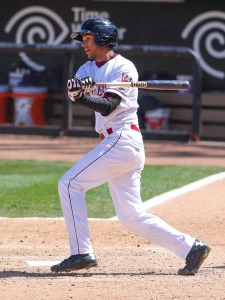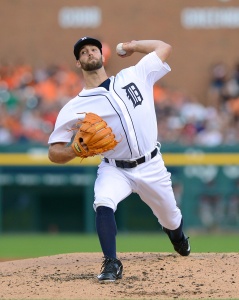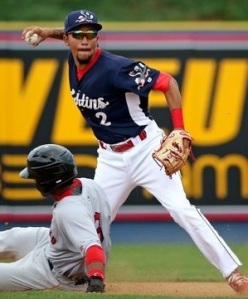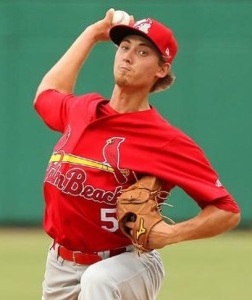Jacob Gatewood was drafted by the Brewers in the 1st round of the 2014 draft, after batting .349 with 2 home runs his senior year at Clovis High School in California.
But despite hitting just two homers his final season of high school, it’s Gatewood’s power that is seen by many as his most impactful tool. 
Gatewood first put that power on display at the national level back in 2013 before he was even drafted, blasting mammoth home runs at Citi Field in front of thousands of people in the junior Home Run Derby, and subsequently made his power-hitting abilities known to a vast portion of the baseball world. With the kind of power Gatewood displayed, it was no true wonder why the Brewers thought so highly of him in the draft.
However, Gatewood has seen his share of ups and downs since beginning his professional career, not posting the power stats many had anticipated he would. But even so, Gatewood still managed to have his best season thus far in 2016, hitting .240 with 14 home runs and 64 RBI’s, with many seeing even better things to come from Gatewood in 2017 and beyond.
Making the transition from his long-time position of shortstop to the unfamiliar third base spot last season, the Brewers are seemingly doing everything they can to help clear Gatewood’s path and get him to the majors as quickly as possible. If Gatewood can continue to tap into the immense power he possesses moving forward, Gatewood should be showing off his talents in the big leagues in the not too distant future.
Jacob Gatewood — top prospect in the Brewers’ organization — took the time recently to answer some of my questions:
1.) At what age did you first become interested in baseball? Who was your biggest baseball influence growing up?
For me you could say baseball was love at first sight. I started playing when I was 8, and once I put the batting gloves on it was over — baseball was all I wanted to do. Growing up, I had a ton of different favorite players, but the one who influenced me the most was my dad. He played some minor league baseball with the Dodgers, Twins, and Cubs. He supported me through it all, and I couldn’t be more thankful for him.
2.) Who was your favorite baseball player growing up? Why?
My first favorite player growing up was actually Troy Tulowitzki. I always liked the way he played and how physical he was on the field. I was lucky enough to meet him a few years ago, and it was a great experience to be able to talk to someone I looked up to so much as a kid.
3.) You were drafted by the Brewers in the 1st round of the 2014 draft. What was that process like for you? Did being present at the MLB Network studio (where the names were being announced live) make the experience all the more memorable?
The process of being drafted is a unique one in a sense; you have to grow up very quickly. You go into your senior year at 18 with a lot of pressure on you, but all the added pressure made it fun for me. My dad has always told me pressure is a privilege, so I really took that to heart my senior year and just tried to soak the whole thing in. Being present at the draft was truly a blessing! They took great care of us, and it was awesome seeing all my friends names called; and of course when mine was called.
4.) Before being drafted, you won the 2013 junior Home Run Derby at Citi Field in front of thousands of people at the stadium and millions more on TV:
Is that the moment you feel your name became ultra synonymous for power with people around the baseball world?
The home run derby at Citi Field was another great blessing. It was the first year they started doing the junior portion of the derby so it was all kind of last minute. One day I was in Georgia, the next I was in New York with my parents getting ready to hit in front of over 50,000 people. It definitely helped get my name out there, and I’m very thankful for USA baseball for giving me that opportunity.
5.) On the negative side of that, do you feel that your home run display on such a national stage led to unfair expectations being placed upon you to hit a mammoth number of home runs right out of the gate in professional baseball as you began your career?
I would say no. I have always been confident in my abilities, so regardless, if I would’ve hit in the home run derby or not I would’ve expected myself to hit a lot of home runs my first couple of years. Now I realize that I’m not the one in control. All I can do is prepare as well as I possible can and play every game like it’s my last. God will do the rest for me.
6.) As with many power hitters, your strikeout numbers have remained very high, with you whiffing more total times than number of games played in each of your first three seasons. What are some of the things you continue to work on to improve your overall approach at the plate?
For me it’s always been pitch selection, so I’ve been working on my vision and really focusing on the mental game of hitting rather than mechanics. I recently visited an eye doctor and realized I needed glasses so that could help a bit as well.
7.) Just this past season, the Brewers worked on converting you from shortstop to third base in order to give you a clearer path to the majors. How difficult did you find it to adjust to a new position you had never previously played?
It was tough the first two months of the season, but the Brewers were awesome with me, being very patient and building up my confidence at third. I had to learn how to be comfortable being uncomfortable, and once I adjusted to that I really started to enjoy playing third.
8.) What do you feel went well in 2016? What are your goals for 2017?
I feel I started to understand how important the mental side of baseball is in 2016, and I can’t wait to put all the things I’ve learned to use in 2017. I have a lot of individual goals for 2017, but most importantly, I want to win a championship. It’s been way too long since I’ve been in a dog pile!
9.) Favorite TV show? Favorite food?
I’m actually not a big TV guy, but I really enjoy the real estate shows on HGTV. My Dad is a general contractor, so we like to watch all the real estate shows together as a family. My favorite food is mac and cheese. It’s literally one of the first things I look for on any menu at any restaurant, but nothing beats the home made stuff.
10.) Lastly, what advice would you give to kids who are just starting out that dream of playing professional baseball one day?
I would tell them success lies in your preparation. When you are prepared it takes all the pressure off of you. It’s like taking a test. When you are prepared you can’t wait to take the test because you know you’ll do good on it, and when you’re unprepared for the test we know we are gonna struggle with it. Baseball is similar in the fact that if we prepare the best we can we are setting ourselves up to perform at our best more consistently! If we do not prepare we may have a few good games in a row but overall we will be less consistent. The difference in a good player compared to a great player is consistency, and in baseball that is an extra hit or two a week than the other guy. It may seem small but over a 162 game season all the little things will eventually add up. But more importantly, I would also tell the kids to trust in God with everything they do. He knew what each and everyone of us were gonna be before He even created the earth, so trust in Him even through the tough times, because He knows what He’s doing and everything is a part of His plan. Give all the glory to Him, live your life for Him, and He will reward you with eternal life in heaven, which is better than any baseball game or anything we can conceive on this earth.
————————————————————————
Big thanks to Jacob Gatewood for taking the time to answer my questions.
You can follow him on Twitter: @Jake_Gatewood2

 Since the draft, Norris has posted some decent stats in the majors after making a unique progression through the minors. Following a couple of poor seasons in 2012 and 2013, Norris absolutely flew through the minors in 2014, jumping from High-A all the way to the big leagues, and going a combined 12-2 with a 2.53 ERA over the course of 25 minor leagues starts that season with three different teams.
Since the draft, Norris has posted some decent stats in the majors after making a unique progression through the minors. Following a couple of poor seasons in 2012 and 2013, Norris absolutely flew through the minors in 2014, jumping from High-A all the way to the big leagues, and going a combined 12-2 with a 2.53 ERA over the course of 25 minor leagues starts that season with three different teams.


 Since the draft, Hader has switched organizations twice, going to the Astros in 2013 and being traded once again to the Brewers this past season. However, all the transitioning has seemingly had little impact on Hader and his ability to post stellar stats. In 2015 alone, Hader recorded a 3.03 ERA with 119 strikeouts over 104 innings pitched and held batters to a mere .224 batting average.
Since the draft, Hader has switched organizations twice, going to the Astros in 2013 and being traded once again to the Brewers this past season. However, all the transitioning has seemingly had little impact on Hader and his ability to post stellar stats. In 2015 alone, Hader recorded a 3.03 ERA with 119 strikeouts over 104 innings pitched and held batters to a mere .224 batting average. Making a steady climb through the minors from 2010 through 2013 — including an appearance in the 2012 Futures Game in Kansas City — Gennett debuted at the big league level in June of 2013. By batting .324 with 6 homers and 21 RBI’s over 69 games his rookie year, Gennett set himself up nicely to be a big part of the Brewers moving forward.
Making a steady climb through the minors from 2010 through 2013 — including an appearance in the 2012 Futures Game in Kansas City — Gennett debuted at the big league level in June of 2013. By batting .324 with 6 homers and 21 RBI’s over 69 games his rookie year, Gennett set himself up nicely to be a big part of the Brewers moving forward.

